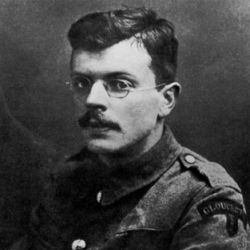
Ivor Gurney
Born on August 28th 1890, Ivor Gurney typified the fine line that is often said to exist between genius and insanity. His talent for musical composition and poetry hid a troubled mind that the battlefields of the First World War would ultimately destroy.
The son of a master tailor, Gurney grew up among working-class people, who found his artistic temperament difficult to understand. Fortunately, he was able to escape into his beloved countryside and into his music and at the age of twelve he was invited to join the Cathedral choir. In 1906, he was articled to the Cathedral’s organist and remained under his tutelage until 1911, when he was awarded a scholarship at the Royal College of Music. Here, Gurney met music historian Marion Scott, who would go on to become one of his most important and loyal friends.
Gurney suffered from mental instabilities, which manifested themselves as mild eccentricities but, when war was declared in 1914, he immediately attempted to enlist, although he was rejected on the grounds of his poor eyesight. Undeterred, Gurney tried again in 1915 and was accepted into the 2nd/5th Gloucester Regiment. He found that the routines and rigours of army discipline suited him and he was able to regain some control over his mental faculties.
Following training, Gurney embarked for France, landing on 26th May 1916. He wrote many letters while overseas, which show his generosity of spirit towards his fellow soldiers. He also wrote poems and sent them back to Marion Scott, who arranged for their publication under the title Severn and Somme in 1917.
Following a wound to his arm, Gurney was also gassed and was then shipped back to England. He felt guilty for – in his opinion – evading his duty, but was deemed unfit to return to active service. Gurney’s mental instabilities began to resurface and he was diagnosed as suffering from delayed shell shock and was eventually discharged from the army in October 1918.
The next few years were difficult for Gurney and he drifted from job to job. In 1922, he moved, uninvited into the home of his younger brother, Ronald, which caused some considerable inconvenience and awkwardness, due to his behaviour. Once this became too much, and following several suicide attempts, the Gurney family had him committed to Barnwood House – a private asylum near Gloucester. However, Gurney managed to escape from this institution, so the decision was made to move him to the City of London Mental Hospital at Dartford in Kent, in the hope that he would be less inclined to make a bid for freedom, once he was away from his beloved Gloucestershire.
Gurney found his confinement intolerable and was frequently hostile, as well as delusional. He wrote letters to the police, urging them to secure his release so that he might be allowed to die in freedom. This was a wish that was never granted: Ivor Gurney died in the mental hospital on 26th December 1937.
Gurney is often referred to today as “mad”, but this merely demonstrates a lack of understanding and awareness. The letters that he wrote and the accounts of his friends from before, during and immediately after the war give an enlightening insight into Gurney’s personality. He seemed completely aware of his mental fragility but remained optimistic, while he was at liberty. He was self-effacing, generous, affectionate and fun-loving. He praised others for their courage, vitality and spirit, but never sought any admiration for himself. Ivor Gurney was a man of rare gifts and qualities, but the greatest of these was the warmth of his heart: his true sense of humanity.